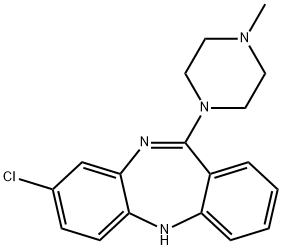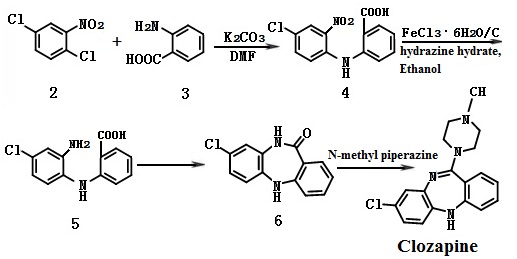1/1
Clozapine
$ 1.00
/1KG
- Min. Order1G
- Purity98%
- Cas No5786-21-0
- Supply Ability100KG
- Update time2019-07-06

career henan chemical co
VIP8Y
 China
China
Since:2014-12-17
Address:Zhengzhou High tech Zone, Henan Province, China
Enterprise Verified
Business Bank account
Basic Contact Infomation
Business Address
Trade Company



Chemical Properties
| Product Name | Clozapine |
| CAS No | 5786-21-0 |
| EC-No | |
| Min. Order | 1G |
| Purity | 98% |
| Supply Ability | 100KG |
| Release date | 2019/07/06 |
AD68
| Product Name: | Clozapine |
| Synonyms: | 5H-Dibenzo[b,e][1,4]diazepine, 8-chloro-11-(4-methyl-1-piperazinyl)-;Asaleptin;clorazil;Clozapin;e)(1,4)diazepine,8-chloro-11-(4-methyl-1-piperazinyl)-5h-dibenzo(;Iprox;Lepotex;W-801 |
| CAS: | 5786-21-0 |
| MF: | C18H19ClN4 |
| MW: | 326.82 |
| EINECS: | 227-313-7 |
| Product Categories: | Active Pharmaceutical Ingredients;Intermediates & Fine Chemicals;Pharmaceuticals;Dopamine receptor;Miscellaneous;API;Isotope;BENOQUIN;Other APIs |
| Mol File: | 5786-21-0.mol |
 |
|
| Clozapine Chemical Properties |
| Melting point | 182-185°C |
| Boiling point | 482.71°C (rough estimate) |
| density | 1.1327 (rough estimate) |
| refractive index | 1.6110 (estimate) |
| Fp | 9℃ |
| storage temp. | Store at RT |
| solubility | ethanol: 1 mg/mL |
| pka | 3.70, 7.60(at 25℃) |
| color | pale yellow |
| Merck | 14,2423 |
| CAS DataBase Reference | 5786-21-0(CAS DataBase Reference) |
| NIST Chemistry Reference | Clozapine(5786-21-0) |
| Safety Information |
| Hazard Codes | Xn,Xi,T,F |
| Risk Statements | 22-36/37/38-68-63-39/23/24/25-23/24/25-11 |
| Safety Statements | 26-36/37-45-16-7 |
| RIDADR | UN 2811 6.1/PG 3 |
| WGK Germany | 3 |
| RTECS | HP1750000 |
| HazardClass | 6.1(b) |
| PackingGroup | III |
| Hazardous Substances Data | 5786-21-0(Hazardous Substances Data) |
| Toxicity | LD50 in mice, rats (mg/kg): 61, 58 i.v.; 199, 260 orally (Lindt) |
| Clozapine Usage And Synthesis |
| General description | Clozapine appears as pale yellow crystalline powder. It is odorless, tasteless with a molecular weight of 326.83 and a melting point 183~184 °C. It is soluble in chloroform, ethanol but insoluble in water. It is withdrawn from market because of causing neutropenia in 1976. Later studies have shown that this product has a good efficacy in treating schizophrenia, and thus had re-entered into market in 1989, 1990, in Sweden and the United States, respectively. This product is a non-classical antipsychotic which can selectively block DA receptors of the mesolimbic system but has a small effect on the nigrostriatal DA receptors. It has a relatively weak blocking effect on D2 receptor, but a strong blocking effect on D1 receptors strong while also has some antagonist effect on D4 receptor and 5-HT2 receptor. Thereby, it has strong anti-psychotic effects. Moreover EPS is less common and does not cause stiff reaction. Owing to the direct inhibition effect on the ascending reticular activating system of the brains, it has a potent sedative and hypnotic effects which can well applied for treating schizophrenia, hallucinations, delusions and youth-based effect. In addition to its good efficacy on treating positive symptoms like agitation, hallucinations, and paranoia, it also has a good efficacy on the negative symptoms. Since this product has a different mechanism of action on blocking DA receptors with traditional antipsychotics, thus this drug may also be effective in treating some classic antipsychotic disease which fails be treated with traditional drugs. It can also be used to alleviate mania and severe sleep disorders. In addition, it also has an anti-cholinergic effect. NE has sympathetic blocking effect, muscle relaxing effect and anti-histamine effect. |
| Pharmacological effects | 1. Antipsychotic effects: Clozapine has good efficacy on treating various types of acute and chronic psychiatric disease. It can alleviate symptoms like excitement, agitation, hallucinations, delusion, thought disorder, depersonalization, and strange movements. The mechanism may be associated with its blocking effect on the dopamine receptor of mesolimbic system, but does not affect the dopamine receptors in the striatum, so this product rarely produces extrapyramidal reactions. 2. Sedative and hypnotic effects: This product can inhibit the spontaneous activity when applied in low-dose. High dose can increase automatic activity. Clozapine can directly inhibit the brain ascending reticular activating system. 3. Anti-cholinergic, anti-histamine and anti-adrenergic effects: The product has a strong anti-acetylcholine effect, and also has suppressing effect on histamine, norepinephrine and epinephrine. |
| Pharmacodynamics | This product is a kind of major tranquilizer which has well therapeutic effect on treating acute and chronic schizophrenia. Its mechanism of action is probably playing a pharmacological effect on central dopamine nerve. It can selectively block dopamine receptors in the limbic system with small effect on nigrostriatal dopamine receptor, so it has a strong anti-psychotic effect. The extrapyramidal side effects are rare. Its function also has no dependence on the activity of adenylate cyclase. |
| Pharmacokinetics | Its absorption through oral administration happens quickly and completely. There is no food effect on the rate and extent of absorption. It is widely distributed to various organizations after rapid absorption and there are large individual differences in bioavailability with an average deviation of about 50% to 60%. It also has hepatic first-pass effect. The plasma concentration reaches peak 3.2 hours (1-4 hours) after taking drugs and has an elimination half-life (t1/2β) about 9 hours. The apparent volume of distribution (Vd) is 4.04~13.78L/kg. It has a high tissue binding rate. After being metabolized by the liver, 80% of it is in the form of metabolites presented in urine and feces. Its major metabolites include N-demethylated clozapine, and the N-oxidant of clozapine. Under the same dose and a constant body weight, serum drug concentrations of female patients are significantly higher than that of male patients. Smoking can accelerate the metabolism of this product. Drug metabolism and renal clearance are significantly lower in the elderly. This product can be secreted from the milk, and can penetrate through the blood-brain barrier. The above information is edited by the Chemicalbook of Dai Xiongfeng. |
| Uses | 1. It is used for treating acute, chronic mania. It can be used to stabilize the emotion of human. It has good efficacy on treating symptoms like, vagrancy, sleep disorder, sadness, panic, tiredness, easy to be ill, sudden violence, and anger. 2. It can be used for treating crazy disease due to a variety of reasons such as losing temper, aggressive, emotional instability, anxiety, tension, and manic, etc. 3. It can be used for treating mental retardation-caused behavioral disorders such as linguistic disorder, poor presentation ability, poor thought and mental ability, lack of abstraction, generalization ability, low perception, narrow perception range, being difficult to distinguish small differences in body shape, size and color, lack of concentration, narrow attention range, poor memory, slow memorizing and reproducing inaccurately, na?ve behavior, immaturity, emotional instability, lack of self-control and impulsiveness, frequently being timid, withdrawn, shy, asymmetrical shape, uncoordinated movements, poor flexibility, performance, or hyperactivity, destruction, aggression. 4. It can be used for treating drug or alcohol-dependence withdrawal syndrome such as acute tremors, agitation, being easy to get startled, and nausea, vomiting and sweating. Upon drinking, the symptoms disappeared immediately, otherwise last for several days. There is sometimes even a short delusions, hallucinations and visual distortion, lisp. Finally, the patient may have seizures or delirium tremens. 5. Can be used for treating insomnia. It is applicable to the various manifestations of insomnia, such as dreaminess and being easy to wake up, heart palpitations, forgetfulness, and tiredness. |
| Synthetic route | Use 2,5-dichloro-nitrobenzene (2) and anthranilic acid (3) to react in DMF to generate 2-(4-chloro-2-nitro) dimethylbenzene (4), dimethylbenzene undergoes hydrazine hydrate/ferric chloride catalytic reduction to produce 2-(2-amino-4-chlorophenyl) dimethylbenzene (5), dimethylbenzene goes through cyclization reaction with the catalysis of polyphosphoric acid to obtain 8-chloro-5,10-dihydro-11H-dibenzo [b, e] [1,4]-dinitrogen-11-one (6). Product in step 6 is condensed together with N-methylpiperazine in the effect of titanium tetrachloride to get the final product. Figure 1 the synthesis route of clozapine |
| Precautions | 1. Induction of the decrease of neutropenia or its development into agranulocytosis is the most serious side effects of this product. So do not take drugs which causes leukopenia simultaneously while taking clozapine, especially avoid taking the traditional antipsychotic or antidepressant drugs or long-acting antipsychotics. Leukocyte count should be performed before treatment in order to understand the patient to return to normal polymorphonuclear leukocytes index. After the start of treatment, weekly leukocyte count should be performed for 18 consecutive weeks. Then the test should be done at least once a month. Do the same things during long-term medication. At each time of consultation, remind the patients to seek medical treatment immediately when infection or fever occurs. When there is an infection or WBC is less than 3.5 × 109/L or be much lower compared to the initial measured index, the white blood cell count should be reviewed immediately. If the absolute value of leukocyte reduced to 3 × 109/L or less and/or neutrophil polymorphonuclear leukocytes have an absolute value being less than 1.5 × 109/L, should be immediately discontinued. 2. For patients with a history of seizures or cardiovascular, renal, hepatic insufficiency, apply a lower initial dose and should increase the dose more gradually. 3. For patients with non-serious liver disease, clinical monitoring and regularly check of liver function is necessary. 4. Remind the patient that this product has the role of triggering drowsiness. So do not drive and operate machinery while taking the drug. 5. It has interaction with the central sedative and antipsychotic drugs, so be cautious when taking medicine. 6. Lactating women should not be breastfeeding upon medication. 7. Disable who are allergic to clozapine. 8. Patients with neutropenia, agranulocytosis or an apparent history of blood disease; Be cautious for patients of alcohol and drug-induced psychosis, poisoning and coma, severe heart, liver, kidney diseases, angle-closure glaucoma, and prostatic hypertrophy-caused urinary tract disease. |
| Side effects | Common adverse reactions include salivation (significantly during sleeping), nausea, vomiting, and abdominal distension. Occasionally fever, neutropenia, and a long-term drug addiction occur. |
| Contraindications | Children under 16 years of age, patients of angle-closure glaucoma, prostatic hyperplasia, spastic disorders or with a history of epilepsy and severe cardiovascular disease should take with caution. Disable it for patients with significantly inhibited central nervous system and with a history of myelosuppression or abnormal blood cells. |
| Chemical Properties | Light yellow crystalline powder with melting point 183-184 °C. It is easily soluble in chloroform, soluble in ethanol, almost insoluble in water. It is odorless, tasteless. |
| Uses | 1. The product has not only a strong anti-psychotic effect, but also a calming effect as a novel broad-spectrum psychiatric drug which is suitable for treating acute and chronic schizophrenia. It has a good efficacy on treating paranoid hallucinations, youth-based diseases. In the angle of alleviating the symptoms, it is quite effective in treating agitation, hallucinations, delusions, contacts, and apastia. 2. Used as antipsychotics |
| Production methods | 2-amino-4-chloro-diphenylamine-2'-carboxylic acid (4''-methyl) piperazine reacts with phosphorus oxychloride to get clozapine. |
| Chemical Properties | Yellow Crystalline Solid |
| Uses | An antipsychotic |
| Uses | depigmentor |
| Definition | ChEBI: A benzodiazepine that is 5H-dibenzo[b,e][1,4]diazepine substituted by a chloro group at position 8 and a 4-methylpiperazin-1-yl group at position 11. It is a second generation antipsychotic used in the treatment of psychiatr c disorders like schizophrenia. |
| Biological Activity | Atypical antipsychotic drug, with a much lower tendency to cause extrapyramidal side effects than conventional neuroleptics. Displays a broad range of pharmacological actions; the antipsychotic effects are thought to be mediated principally by 5-HT 2A/2C and dopamine receptor blockade (K i values are 21, 170, 170, 230 and 330 nM for D 4 , D 3 , D 1 , D 2 and D 5 receptors respectively). |
Company Profile Introduction
Established in 2014,Career Henan Chemical Co. is a manufacturerspecializing in the sale of fine chemicals. Mainly deals in the sales of: Pharmaceutical intermediates OLED intermediates: Pharmaceutical intermediates; OLED intermediates;



